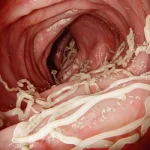Worms in the Soil!
According to the CDC, mature female hookworms can produce 10,000–30,000 eggs per day, while mature female roundworms can produce up to 200,000 eggs per day.
Roundworms produce eggs in abundance. Some species of roundworm may contain more than 27 million eggs at one time and lay more than 200,000 of them in a single day. The fertilized eggs become infectious after two weeks in soil, and they can persist in soil for 10 years or more.
Puppies with worms may have the following symptoms:
- Vomiting: Puppies with worms may vomit, and the vomit may contain worms.
- Change in appetite: A puppy may lose interest in foods they previously liked, or have an increased appetite.
- Coughing: A common symptom of worms, especially heartworms, hookworms, and roundworms.
- Lethargy: A puppy may lose interest in playing, walking, or eating.
- Distended abdomen: A bloat, swelling, or tenderness in the abdomen, especially noticeable in puppies, is called “pot belly”.
- Scooting: A puppy may slide its bottom across the floor or carpet to relieve itching caused by worms.
- Weight loss: Worms steal nutrition from the host, which can lead to weight loss.
- Diarrhea: A common symptom of worm infection, with irregular bowel movements and chronic loose motions. For example, hookworms may cause black-tar looking stool, while whipworms produce excessively watery stool.


